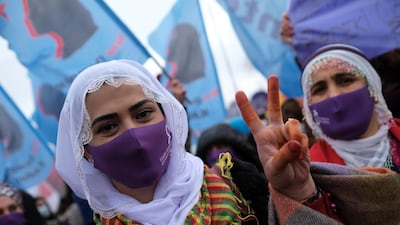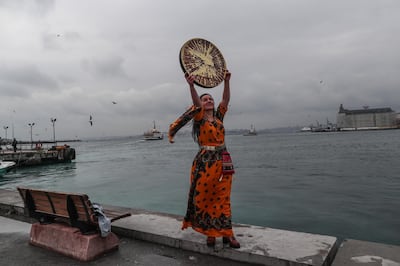A horrifying video emerged on Turkish social media this past weekend showing an angry man in Samsun province kicking his prone wife in front of their five-year-old daughter and smashing her head against the pavement as the person shooting the video urged him to stop.
The man has since been arrested for attempted murder – yet another reminder, as we mark International Women’s Day, that killings of women have steadily increased in Turkey, including another 10 per cent last year, to 320, according to Bianet figures. With 55 confirmed femicides in January and February, 2021 is on pace for another increase.
Despite such grim statistics, women in Turkey have seen signs of progress. For one thing, femicide and sexual assault receive vastly more media attention nowadays, in the wake of the #MeToo movement and viral hashtags linked to high-profile murders. Turkish police this week released a new mobile app, Kadin Destek (Women's Support), that makes it easy for users to report incidents of violence against women, in six different languages (though Kurdish, Turkey’s second-most spoken language, is not among them).
A handful of civil society organisations have emerged to support women and in recent months artists have gotten on board as well.
This week the Ankara Art Theatre is hosting the Women’s Plays Festival. Seven different plays will be performed in four cities across Turkey, with the proceeds going to women’s rights groups like We Will Stop Femicide and Purple Roof.
Turkish culture and society have seen other positive strides. Journalist Hazal Sipahi's bold, one-year-old Turkish-language podcast on sexuality and gender issues has given a broader platform to women's rights and LGBTI+ issues, as have the long-running protests at Istanbul's Bogazici University.
Unlike the protests, her podcast is mainly accessed via Spotify and thus may be safe from government pressure. “Spotify is a music platform and there are many supporters of the government in the music business,” Ms Sipahi told me last week, before referring to a Turkish pop star who famously met President Recep Tayyip Erdogan. “They don’t want to get into trouble with Demet Akalin just to censor me.”
On television, two of Turkey's top series in recent months have been women-centred. The first, Ethos, follows two women, one provincial and conservative, the other educated and worldly, as they navigate Istanbul's shifting 21st-century society. Even Turkish state broadcaster TRT said the show had taken the country "by storm".
In the second, Bonkis, the main character is a millennial slacker played by the show's writer and creator, Deniz Tuzuysal. The protagonist, also named Deniz, breaks ground as one of Turkey's first leading ladies to date and dress as she pleases without criticism.
Yet such criticisms remain commonplace in Turkey, and may have increased under Erdogan's conservative ruling Justice and Development Party (AKP). Two of the country's bolder and more outspoken politicians are women, and both have seen their profile grow of late. Canan Kaftancioglu, head of the main opposition Republican People's Party (CHP) in Turkey's largest city, Istanbul, was the subject of a glowing profile in leading American news magazine Time last month.
She “represents something unfamiliar and fresh...unafraid to confront the old guard or side with the marginalized,” according to the profile. The magazine also pointed to CHP Istanbul Mayor Ekrem Imamoglu’s 2019 victory over the AKP, which had controlled the city for decades. “She played a central role in engineering President Recep Tayyip Erdogan’s biggest electoral defeat in years.”
Meral Aksener also played a role in that vote, as her nationalist Good Party backed the CHP as part of their Nation Alliance. Since breaking away from the far-right Nationalist Movement Party (MHP) in 2017, she has carved out a new style of Turkish nationalism – progressive, urbanist and witty, rather than xenophobic and stodgy. And few Turkish politicians have challenged the country’s longtime leader as sharply and reliably.
Yet both have faced deeply troubling personal and public attacks. Last year, Ms Kaftancioglu received a barrage of sexual assault threats on social media after she defended the wife of jailed Kurdish politician Selahattin Demirtas. And pro-government media outlets have repeatedly claimed to have a video showing Ms Aksener having an affair. Of course, no video has ever emerged and she has vehemently denied the accusations, which are typical of the slander successful women in Turkey may face today.
AKP officials have in recent years urged women to have more children, stay home and avoid laughing in public. Turkish Islamists and AKP backers have called for Turkey to leave the Istanbul Convention, the leading global compact to curb violence against women. Their campaign has spurred the creation of the recently trending hashtag, #IstanbulSozlesmesiYasatır – or “Keep the Istanbul Convention Alive”.
One AKP move from several years ago – allowing headscarves in universities and public institutions – has given women more opportunities, and gained widespread approval, even from the opposition. Yet it is no surprise that Turkey sits near the bottom of OECD rankings in terms of women executives and female employment, with just 28 per cent of women in the labour force, compared to nearly 75 per cent for men.
What may surprise is that this reality contradicts the wishes of Turkish society. A 2020 survey by Turkey’s top think tank, Tepav, found that 88 per cent of Turks want to see more women in the workforce, including nearly 84 per cent of conservatives.
Led by rights groups like We Will Stop Femicide, feminist protesters in Turkey were out in force this weekend, making their presence felt in advance of bigger protests planned for the day of commemoration on March 8.
Perhaps in the weeks and months ahead such strong expressions of public opinion, combined with the research of bodies like Tepav and the outspokenness of new cultural voices, will drive the government, voters and civil society to push open more doors and enact greater protections for women.
David Lepeska is a Turkish and Eastern Mediterranean affairs columnist for The National



